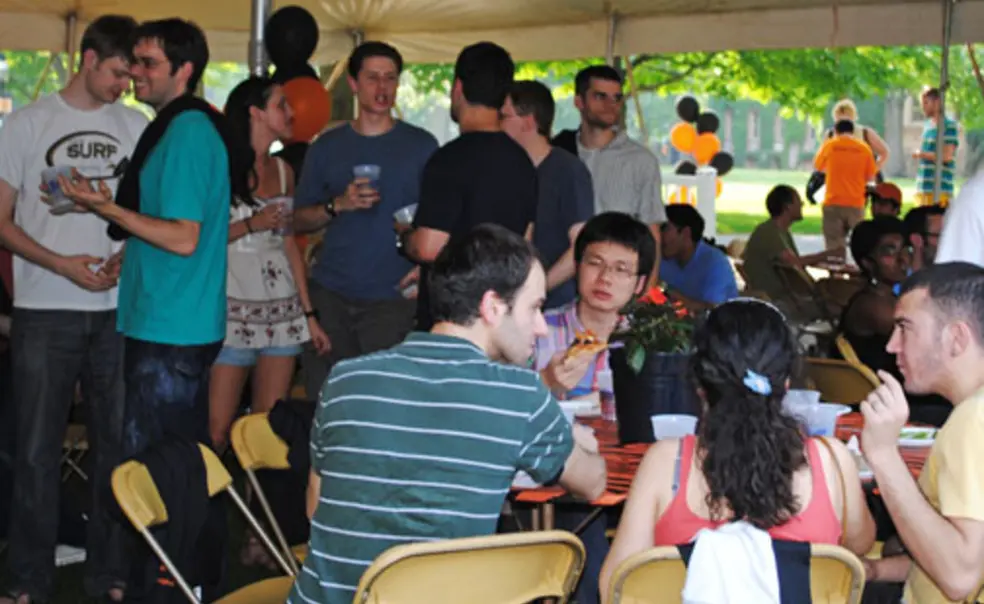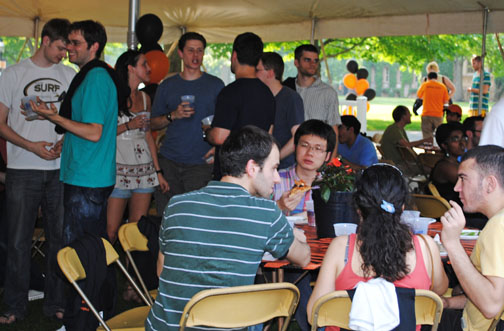Assessing a renewed focus on grad students, alumni
A pizza and ice cream celebration for grad students who have passed their generals. Moving the hooding ceremony for graduate-degree recipients to Princeton Stadium to accommodate more guests. More e-mail communications with grad alumni.
These are small steps, perhaps, but they’re signs that Princeton is paying more attention to the grad-student experience and to the connection with graduate alumni, according to University officials.
A year ago the Commission on Graduate Alumni Relations issued a 24-page report that urged the University to work toward equitable treatment of graduate students and alumni with their undergraduate counterparts.
At a meeting during Reunions of the board of the Association of Princeton Graduate Alumni (APGA), which created the commission, alumni and University officials gave an upbeat progress report on the commission’s proposals. “It’s very heartening to see all the attention,” said APGA president Rose Li *92.
New graduate-student housing planned for the Hibben-Magie site that “recognizes the importance of community space” and the reopening of a campus pub — recommended by another study this spring — would have significant benefits for grad students, said University vice president and secretary Robert Durkee ’69.
William Russel, dean of the graduate school, said initiatives now under way range from a Facebook page that would serve as a “virtual home” for all grad students to planning for renovations of the “old Frick” chemistry lab that could provide grad-student space.
Margaret Miller ’80, assistant vice president for alumni affairs, said graduate alumni are receiving electronic newsletters from the APGA and e-mail alerts with each issue of PAW that highlight content of special interest to grad alums.
The commission report found overlapping missions in reaching grad alumni among the graduate school, the Alumni Association, and the APGA. Li said ways to integrate APGA and Alumni Association efforts will be explored over the next year.
At the same time, she said, the APGA wants to enhance its strong working relationship with the graduate school to further improve the graduate-student experience.
The graduate school is encouraging individual departments to reach out to their alumni, an idea endorsed by the commission. Russel said that the geosciences and art and archaeology departments would like to host two- to three-day reunions of their graduate alumni, separate from Reunions weekend, if University funding is approved.
The commission said the University’s 40-member board of trustees should include at least 10 graduate alumni, reflecting the proportion of grad alums in the alumni body. There are now three graduate alumni on the board, with two seats reserved for them.
Durkee said that while the board felt that it would be desirable to add graduate alumni, the trustees decided not to set aside additional seats for them. The board also chose not to earmark a seat specifically for a young grad alum as the commission recommended, similar to the seat that exists for a young undergraduate alumnus.
Instead, Durkee said, the board charged its board development committee to consider and nominate more graduate alumni.













10 Responses
Jim Anderson *63
10 Years AgoReporting grad-alumni news
I read with interest the PAW article (Campus Notebook, July 6) and letters (Oct. 26) about increasing grad-alumni participation in Princeton. They provoked conversations with friends who received graduate degrees at non-Princeton institutions: “How would you characterize your interactions with your graduate alma mater?” The uniform answer was: “Poorly — I have no feeling for the institution at large.” All felt their prime interaction was with their department (broadly), or (more narrowly) with their thesis prof’s research group. This response cut across age/academic disciplines. (My Ph.D. is in chemistry, but I actually spoke with a Princeton Ph.D. in English.)
Bottom line: Weak grad-alumni-institution interactions are the norm. Princeton’s situation is typical. After they receive their degrees, there’s no strong reason for grad alumni to remain in contact with one another, with their departments, or with the institution at large. The Woodrow Wilson School seems to be an outlier, because there are professional (networking) reasons for its graduates to maintain contact with one another. I suspect graduate alumni of schools of medicine, law, and business administration may have relatively strong post-degree interactions, but this doesn’t help Princeton.
A modest proposal: Since interactions seem to be department-based rather than institution-based, I suggest that Princeton create department-based “graduate alumni secretaries” (GAS) whose functions would parallel those of the undergraduate alumni class secretaries. A GAS would be a graduate alumnus, not a faculty or departmental staff member. The GAS might collate and disseminate news about graduate alumni, organize annual poster sessions for graduate alumni, etc. They also might help recruit the best and brightest seniors from their undergrad alma maters into Princeton graduate programs.
Patricia M. Lyons *78
10 Years AgoThe grad-student experience
I loved my three years in the grad school, and because a couple of my friends in the department were resident advisers in undergrad dorms, I felt very connected to the rest of the campus — I attended parties, dances, and dinners at some of the clubs and got to know many of the undergrads, one of whom is still a friend after 40 years.
One of the problems with connecting with grad alums is that many of us hold academic positions and are not exactly rolling in cash, compared to those in sciences, engineering, and business with a Princeton bachelor’s degree. If the goal in reconnecting is to increase substantially Princeton’s endowment, I don’t think this is a good way to go about it. We have wonderful memories and degrees to be proud of, but most of us in the humanities won’t be leaving any endowed chairs in our wake.
Benjamin R. Beede *62
10 Years AgoThe grad-student experience
Stephanie Turner *04 was overly restrictive in her description of Princeton graduate students as “future professors in training” in a letter to PAW (Oct. 5). Although many of us have made or are making careers in colleges and universities, a large number of graduate students pursue other paths in government, the private sector, elementary and secondary schools, and nonprofit organizations. I think we need to keep this fact in mind when discussing any aspect of graduate education at Princeton.
Ron Fredrick ’55
10 Years AgoThe grad-student experience
What’s all this fuss about a lack of grad-student cohesion with the rest of the University (letters, Oct. 5)? For the 1954–55 Triangle show, Tunis, Anyone?, one of the lead roles — that of government lawman J. Edgar Westinghouse — was filled by grad student John C. Macrae *55. I’ll admit that there were some who were queasy about director Mike Stewart’s choice, including the Triangle president (me), but Macrae was a big hit. After Triangle, Stewart further proved his show-biz chops by winning a Tony for scripting Hello, Dolly!
Perhaps current-day Trianglers will consider emulating ’55’s willingness to accept grad students at auditions.
Marisa Biaggi *06
10 Years AgoReconnecting with grad alums
As a graduate student at Princeton from 2000 to 2006, it was only by making a particular effort — in my case, by serving as a founding member of Princeton Stand-Up Comedy — that we felt the sense of inclusion that one might expect. I am always delighted to hear about the University in the news and elsewhere, and look forward to more events that are focused not just on graduate students but are inclusive of all alumni, as well as a more complete integration of graduate alumni into the many Princeton alumni networks. Like others, I would love to see more graduate alumni named to Princeton’s board. All told, however, this is a great step in the right direction, and most appreciated!
Alan Johnson *08
10 Years AgoReconnecting with grad alums
Thank goodness this issue is getting some serious attention. Graduate students certainly can be involved in campus life, but they are excluded by default. It is important that the University start finding ways to integrate the graduates and undergraduates into a cohesive overall culture. When it comes to Princeton grad-student social life, the Graduate College is by far the most important institution. Unfortunately, most grad students are forced to leave the GC after a year or two, due to lack of overall housing space and individual living space, and once people end up at the far-flung apartment complexes, the culture incubated by the GC tends to evaporate. Aside from better integration with the main campus, the University should look into ways to build on the community of the GC.
Ranjan Pal *84
10 Years AgoReconnecting with grad alums
As one of the few graduate alums to head a major Princeton alumni association (the Princeton Club of India, or PCI), I am glad to see the University beginning to re-engage more strongly with its graduate alumni (Campus Notebook, July 6). However, the proof of the pudding is in the eating, and I think substantive change will only come about when there are more graduate alumni on the Board of Trustees. The commission was entirely right in recommending a 25 percent target for the board, and I hope that this is eventually achieved. The PCI actually won an APGA Regional Association Award in 2010 for our efforts to more fully engage graduate alumni: Do check out the awards section on our website, http://tigernet.princeton.edu/~pcindia/index.html.
Leanne Tobias *78
10 Years AgoReconnecting with grad alums
Additional outreach to graduate-school alums is a most welcome development, and I am extremely happy to learn that Princeton will be focusing more regularly on all its alumni. I do hope that more graduate alumni are named to Princeton’s Board of Trustees.
As a graduate alum, I’d also appreciate the fuller integration of alumni into all alumni networks that serve Princetonians, including local Princeton alumni clubs, affinity organizations, and on-campus events (P-rade, Reunions). I watch all Princeton news with interest and appreciate updates on all newsworthy events relating to the University — my interest is not confined to graduate-school news.
Aaron Alter *77
10 Years AgoReconnecting with grad alums
I’m glad that the grad students are getting more attention. When I was at Princeton, I felt that we were pretty isolated from the general campus experience.
Stephanie Turner *04
10 Years AgoReconnecting with grad alums
Pizza parties and Facebook pages are all well and good, but the graduate experience at Princeton will not be changed by such lip service. Graduate students are future professors in training, of whom the University should be proud, not treating as if they were invisible. I am still stinging from a student tour guide’s remark, which I overheard my first year as a graduate student, that “all classes are taught by professors.” What about the hundreds of graduate teaching assistants? No professor ever set foot in the French 101 class I taught or the German 101 class I took. The only change I have noticed is that I am asked more frequently to donate. When someone from the administration contacts me to ask why I, and many like me, did not complete the Ph.D. program and chose to stop at a terminal master’s, then I will know that attitudes are really changing.